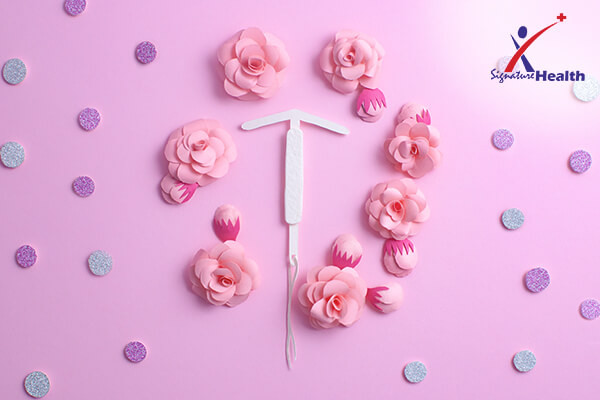Intrauterine devices (IUDs) are one of the most recognized long-acting reversible contraceptives (LARCs). They are popularly known for their use as a contraceptive, however, they can also be inserted to manage heavy menstrual bleeding as well as reduce pain during periods and due to endometriosis (a condition in which tissue similar to that which lines your uterine wall grows outside of your uterus). IUDs are shaped like a “T” and are slightly larger than the size of a quarter. They are inserted vaginally by a health care professional into the uterus to prevent pregnancy and come in two FDA approved types:
- Hormonal IUDs: Mirena, Kyleena, Skyla, and Liletta (99.7% effective)
- Non-Hormonal IUDs (copper): Paragard (99.3% effective)
Hormonal IUDs release a progesterone-like hormone into the uterus which helps thicken the cervical mucus making it difficult for the sperm to reach the egg. Copper IUDs release copper into the uterus resulting in an inflammatory reaction that creates a hostile environment for sperm, which prevents the fertilization of the egg.
The Pros Of IUDs
Despite the fact that modern IUDs are quite safe and effective, they still tend to get a bad rap. Horror stories about IUDs getting stuck in the abdominal wall or the development of pelvic inflammatory disease have spread making it seem like IUDs are a dangerous form of contraception that should be avoided. However, uterine perforations only occur in 0.01% of cases. Research and medical advancements have made IUDs much more safe and effective and offer many benefits such as:
IUDs are long-acting: Depending on which IUD you and your doctor decide is right for you, they can last anywhere from 2.5 years to 12 years. Hormonal IUDs will only last a maximum of 5 years whereas copper IUDs can last for up to 12. This means no more worrying about remembering to take a birth control pill every day for years to come!
IUDs are low maintenance: Because IUDs stay in place for a multitude of years, this form of contraception is perfect for women who are always on the go or who tend to forget to take their birth control pill on a regular basis.
IUDs are reversible: One of the biggest advantages of IUDs is that their contraceptive superpowers are instantly and completely reversible. When you are ready to start a family, your doctor will be able to remove the IUD with one quick appointment.
The Cons Of IUDs
IUDs do not protect against sexually transmitted infections (STIs): IUDs work by creating an inhospitable environment for the sperm or preventing it from reaching the egg. IUDs do not protect against STIs since the sperm is still entering through the vagina. You will still be required to use a condom as extra protection to prevent contracting an STI. Condoms are still only 98% effective at protecting against STIs, so be sure to speak with your doctor about safe sex practices to protect your sexual health.
Your doctor must insert the IUD: You cannot just go to your local drugstore to purchase an IUD and insert it yourself. Your doctor must be the one to insert the IUD to ensure it is placed correctly. They will also be the ones to remove your IUD as well when the time comes.
IUDs may cause increased bleeding or irregular menstrual periods: Hormonal IUDs may cause irregular menstrual periods. Some women report their periods disappearing altogether while the IUD is still inserted. Copper IUDs may increase menstrual bleeding and cause significantly more cramping.
Calgary IUD Clinic
There are plenty of reasons why you might be considering getting an IUD, but before you make the decision to get one, be sure to speak with your doctor to see if an IUD is right for you. It will all come down to your unique medical history and anatomy as well as your lifestyle and preferences when it comes to contraception.
At Signature Medical Women's Health Clinic, we are committed to providing our patients with a range of advice and services related to women's general, reproductive, and sexual, and vaginal health. Our Women’s Health Clinic is compliant with the RAICE (Rapid Access IUD Centres Of Excellence) to provide our patients with the highest standard of IUD contraceptive care and insertion. We believe in the power of education and ensure all of our patients are equipped with all of the information, support, and care they require to make informed decisions about their sexual health. To learn more about IUDs and find out if this form of contraception is right for you, contact our Women’s Health Clinic by calling 403-454-7550 or by filling out our online contact form.
FAQs
Q: How is an IUD inserted?
A: To put the IUD in, a doctor will first insert a speculum (a device used to open the vaginal canal) into the vagina. They will then insert the IUD through the cervix and into the uterus. The process is very quick, only lasting about 5-10 minutes.
Q: Can I get an IUD if I am on my period?
A: The great thing about IUDs is that they can be inserted at any point during your menstrual cycle, even while on your period.
Q: Does getting an IUD hurt?
A: Some women report feeling no pain during the procedure whereas others report feeling painful cramping or slight headaches. If you do feel pain, it will subside after a day or two and can be treated with over-the-counter pain medication.


.png)



